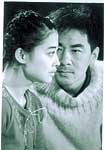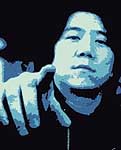|
German playwright Johann
von Goethe's signature work, Faust, tells the tale of
a lofty scholar who sells his soul to Satan in exchange
for a life filled with love and happiness. It is a piece
of theater that is rarely staged, due to the work's
cryptic and often confusing narrative. But this year
- the 250th anniversary of Goethe's birth - a Beijing
production has reinvented the fantastical exploration
of the human psyche, and the word is out that Hell has
never been so much fun.
Bootleg Faust is the
latest stage creation of China's leading experimental
theater director, Meng Jinghui. Having already successfully
directed such critical hits as Comrade Ah Q, Waiting
for Godot, Accidental Death of an Anarchist and this
past summer's Rhinoceros in Love, the 33 year-old director
has embarked on an ambitious adaptation of the German
classic which is currently playing to standing room-only
audiences in Beijing's People's Art Theater.

Written over a period
of six decades, Goethe's Faust is a complex alchemical
drama whose five acts weave together an elaborate web
of love, power, and the search for happiness and achievement.
It is the story of the scholar Faust who, due to his
pursuit of knowledge and study has repressed his human
feelings. He is tricked into a bargain with the devil
Mephistopheles whereby he is granted the freedom to
pursue the human desires he has until now repressed
on the condition that when he does find 'true happiness'
he will surrender his soul. He discards his scholarly
robes and, with Mephistopheles' devious guidance, pursues
the young student Gretchen and eventually corrupts and
destroys her. Like all good tales about intellectuals
going to Hell, Faust is a quest for self-discovery and
fulfillment whose main narrative device is a kind of
suspense employed by most horror films (when the beautiful,
scantily-dressed maiden goes upstairs to investigate
the strange sound in the attic instead of running out
the front door and calling 911).
The production currently
being staged is a visually stimulating exploration of
human nature and an often hilarious satire of Chinese
pop-culture. Meng Jinghui stays true to his own innovative,
trademarked style by skillfully wielding a hyperactive
phalanx of lights, sound, movement, and language to
distract the audience from the play's minimalist action,
plot, and character development.
The 'stage' for Bootleg
Faust is a ground-level brick floor featuring three
simple wooden tables, surrounded by piles of sand forming
the only barrier between the actors and their audience.
This stark space functions, among other things, as a
spartan scholar's cell, a bar, a model's catwalk and
the planet Mars. The intimate black-box feeling of the
Small Stage of the People's Art Theater, and the actors'
innovative use of space - Mephistopheles first appears
hanging from the ceiling - ensures that the audience
is constantly involved in the drama unfolding before
them.
With Faust as the vehicle
we are transported through a bizarre dream-like world
of pleasure and pain as he explores the source and meaning
of 'pure happiness.' The journey he embarks upon mirrors
the reality of the individual trapped within any given
society, and the Chinese Faust's discoveries about beauty,
achievement, power, and love are as applicable to modern-day
denizens of the People's Republic as they were to 18th-century
Europeans.
As with many of Meng
Jinghui's other productions, such as Accidental Death
of an Anarchist, Goethe's Faust has been transported
to modern-day China and adapted accordingly. Well known
for weaving contemporary events and trends into his
plays (to consistently hilarious effect), Meng and his
cast are prone to making changes and adjustments to
the play, often on a daily basis. While the fundamentals
remain constant, Meng does not shy away from experimentation
even well after the premiere - a practice that enhances
Meng's reputation of being simultaneously popular and
avant-garde.
"We improvise everyday,"
says Meng. "The music was different yesterday than it
was today, and it will probably be different again tomorrow.
Things change all the time."
Although instrumental
in choosing these situations, Meng insists that he is
simply one part of the creative process:
"I'm just the man who
makes choices. Some people think the director does everything,
but, in fact, I just make certain decisions. Perhaps
I'm cleverer than some when it comes to making choices,
but a play involves so many elements: actors, lights,
music. A stage performance never comes down to just
one individual."
The dialogue in Bootleg
Faust incorporates diverse dramatic devices including
passages from classical Chinese poetry, references to
characters from Chinese history and literature, contemporary
slang, parodies of Greek mythology, and spoofs of the
absurd dialogue that clutters so many contemporary TV
shows.
Although the original
work was adapted for the Chinese stage by Shen Lin,
head of the Central Academy of Drama's Theater Research
Institute, the script was a collaboration of ideas and
improvisation. The play's language is certainly the
most powerful dramatic tool in Bootleg Faust, with acerbic
criticism pointed at China's intellectuals, both traditional
and modern, via the exaggerated use of classical literature
and stereotypical representations of the conventional
Chinese scholar.
The language would not
be as powerful however, if it were not for the additional
theatrical tools such as lights and music. Composed
by Chinese rock legend He Yong, Bootleg Faust's interludes
are unannounced, sudden bursts of energy that include
haunting Greek choruses (traditionally employed to begin
and end dramas), a Parisian ballad for Faust's seduction
of Gretchen, and Cantopop-techno tunes accompanied by
a pom-pom-shaking squad of cheerleaders.
Although even non-native
speakers with a strong command of Chinese may find many
of the historical and literary allusions difficult to
follow, Bootleg Faust is visually engaging, high-energy
entertainment. Fear not if the play's sophisticated
observations on the human condition pass you by; the
powerful acting, sharply-honed comedy and tight choreography
will keep in your seat from start to finish. Bootleg
Faust is a work whose appeal and relevance is universal,
whether you've sold your soul to the devil or just happen
to be an ordinary sinful human being. The desire for
unadulterated happiness - an inescapable human theme
- is one that anyone can relate to.

As Meng Jinghui says,
"To me, Faust is not a foreigner. He is me. He is all
of us."
Bootleg Faust
plays through January 7 at the Small Theatre of the
People's Art Theater, No. 22 Wangfujing Street, Dongcheng
District,
Tel: 6525-0123. Shows start at 7:15 pm.
|





